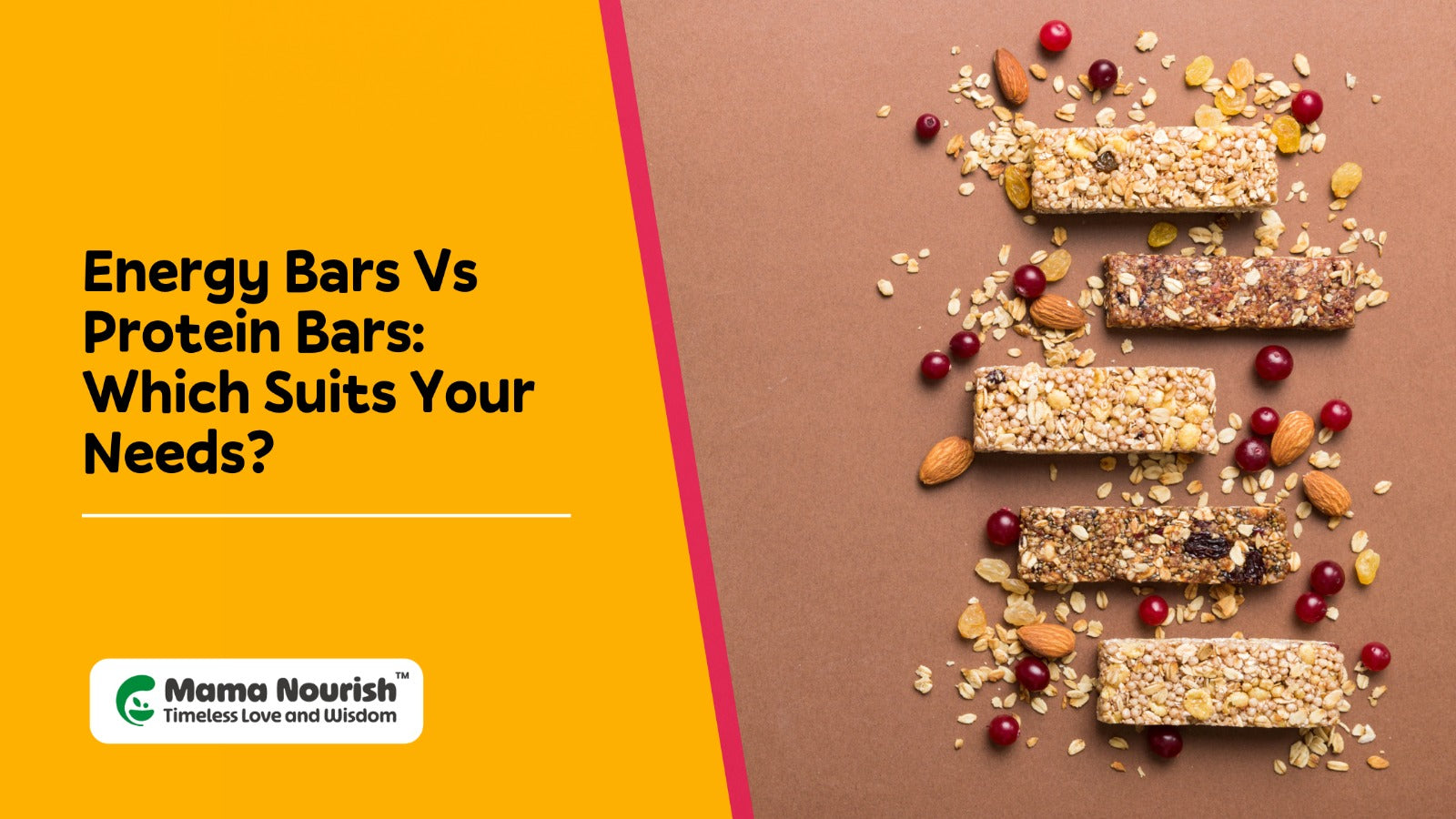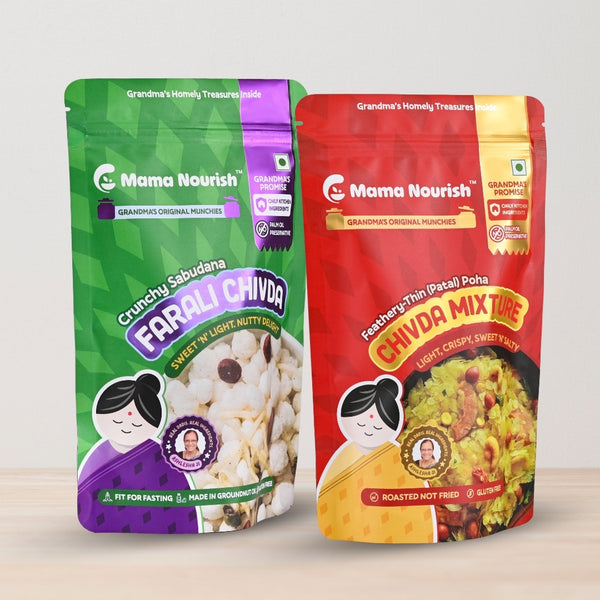
Energy Bars Vs Protein Bars: Which Suits Your Needs?
In today’s fast-paced world, snack options like energy bars and protein bars are gaining popularity. They offer a convenient solution to hunger pangs, energy dips, and pre and post-workout snacking. Understanding the difference between energy bars and protein bars is essential for making informed choices that fit your needs!

Let's go through the difference between energy bars and protein bars.
What Are Energy Bars?
Energy bars provide a quick as well as sustained boost of energy. They have carbohydrates, the body’s primary source of fuel, and fats and proteins. They release quick energy from carbohydrates and sustained energy release from fats and proteins. These bars are ideal for activities requiring sustained energy, like hiking, cycling, or during a work break or on-the-go fuelling.
Key Features of Healthy Energy Bars
A Blend of Carbohydrates, Protein & Fat
Healthy Energy bars usually derive their calories primarily from nutritious food sources. They use ingredients such as dried fruits which are natural sources of simple carbohydrates, providing quick energy along with vitamins, minerals, and antioxidants. They also act as natural sweeteners in energy bars, eliminating the need for refined sugars. This ensures that the energy is readily available to the body, not just empty calories.
While energy bars may contain some protein and fat, these are not their primary focus. The inclusion of these nutrients helps maintain a balance without compromising energy release.
Other healthy ingredients are nuts and seeds– known especially for their healthy fats; nuts and seeds also provide fibre and protein. Plus they are rich in antioxidants. For example—Walnuts are rich in polyunsaturated fats, especially omega-3 fatty acids which support brain health.
Convenient to Carry & Store
Energy bars are easy to carry and consume, making them an excellent option for on-the-go energy replenishment.
When to Choose Energy Bars?
Energy bars are ideal for situations where you need an energy boost while committing or need fuel up on a long work day.
Perfect for Office Snacking

Energy bars are perfect for professionals and students who don’t have time for a full meal but need a quick fuelling. Yes, healthy energy bars can help you get over that afternoon slump.
As a Pre-workout Snack
Healthy energy bars are ideal as a pre-workout snack. Some bars can only be consumed as post-workout snacks.
As a Mid-Day Snack or Meal Replacement
For those experiencing the dreaded afternoon slump, an energy bar can help restore focus. If you are taking them for meal replacement make sure to go through the ingredients list carefully to assess whether you are getting enough nutrients.
When You are On a Trip

Whether you’re running a marathon, hiking a mountain, or camping, energy bars provide the quick-release fuel your body needs.
What Are Protein Bars?
Protein bars, as the name suggests, contain high protein content. They are designed to support muscle repair, growth, and recovery, making them popular among fitness enthusiasts and athletes.
Key Features of Protein Bars
Protein-Packed For Muscle Recovery Benefits
Protein bars typically contain a high amount of protein per serving. Sources may include whey, casein, soy, or plant-based proteins like pea or rice protein.
Protein is essential for repairing and building muscle tissues, making these bars ideal post-workout snacks.
Convenient to Carry & Store
Like Energy bars, protein bars are also convenient to carry and consume.
When to Choose Protein Bars
Protein bars cater to individuals focusing on fitness, muscle repair, or weight management. Here’s when you should reach for one–
Post-Workout Recovery

Consuming a protein bar after exercise helps repair muscle tissues and promote recovery.
Meal Replacement
Protein bars are often satiating, making them suitable as a small meal replacement.
Weight Management
Protein helps control appetite, making protein bars a good option for those looking to curb cravings and stay fuller for longer.
Choosing the Right Bar for You
When deciding between energy bars and protein bars, consider your goals, activity level, and dietary needs.
Scrutinize the Label
Always check the nutritional content to ensure the bar meets your needs. Check nutritional values given per serving and calculate how much you actually eat in terms of calories and nutrients.
Quality Ingredients is the Key
Choose bars with natural ingredients like whole grains, millet, nuts, seeds, and dried fruits. Avoid bars loaded with artificial additives, sugars, and preservatives. Bars which are high in refined sugar only give empty calories, plus those quick energy boosts will lead to further crashes and you will end up eating more later.
Consider Allergies and Dietary Restrictions
Look for options depending on your specific dietary needs. If you are undergoing any medical conditions, it's always advisable to consult a healthcare professional before making dietary changes.

FAQs on Energy Bars Vs Protein Bars
1. How do I choose the best bar for my needs?
The healthy energy bars provide quick & sustained energy, so if you're tired or are on a trip, travelling or on an adventure the energy bars are a great choice. They are also helpful in beating hunger pangs or as meal replacements, depending on the ingredients used. For muscle recovery/building or after an intense workout, opt for a protein bar with high protein content. Whether it's energy bars or protein bars the key is to pick the ones that align with your dietary goals. So check the calories and other nutritional facts before buying. But make sure that they are made from quality Ingredients–Look for familiar ingredients and a long list of chemical jargon is usually a red flag.
2. Are energy bars and protein bars good for weight loss?
It depends on your dietary goals and the specific bar's nutritional profile.
3. When is the best time to eat energy bars?
Energy bars are perfect for pre and post-workout fuel, mid-day snacks, or as an on-the-go energy boost to keep you active throughout the day.
4. How should I store the energy bars?
You can store most of the energy bars at room temperature. For example, our LadduBars have a shelf life of 6 months without any refrigeration.
5. What’s the difference between plant-based and whey protein bars?
Plant-based protein bars use proteins derived from sources like peas, brown rice, or nuts, making them suitable for vegans. Whey protein bars are derived from milk and hence contain lactose. The amount of protein you get depends on the product. So, check the pack.







